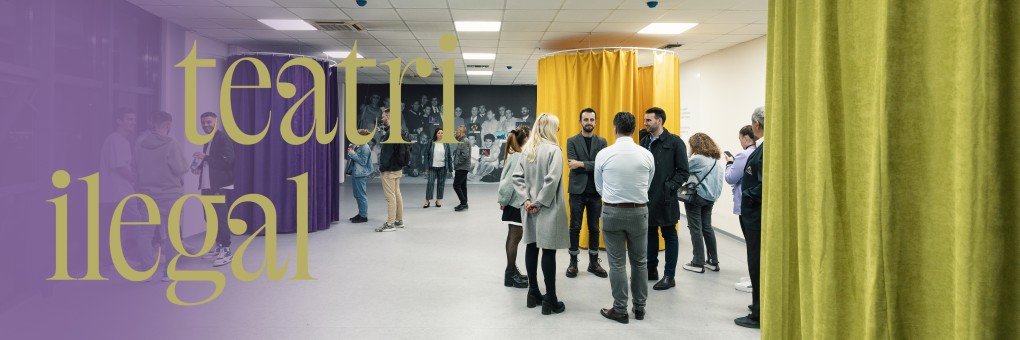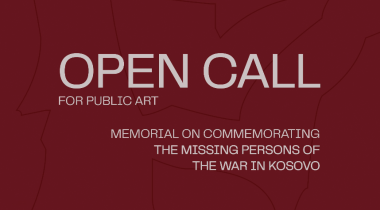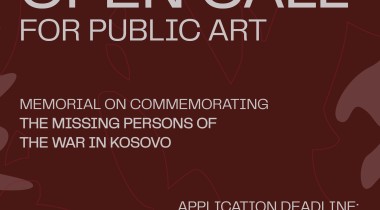On Friday, October 6, 2023, the exhibition "Illegal Theater" by Sovran Nrecaj was opened at the Documentation Center Kosovo. The artist presented a documentary of the same title, which, through the narratives of three characters who were part of that theater, manages to bring back a piece of Kosovo's history and the peaceful resistance of the nineties. The exhibition comes as a result of the open call for artistic projects that deal with the past - DwP Creations where through small grants the Humanitarian Law Center Kosovo aims to encourage young artists in the creation of artistic works that deal with the themes of the past.
In the early nineties, the theater in Ferizaj had closed its doors to Kosovo Albanians. Waiting took its place. Waiting for another show, a new story, a different future, which would not include war and crimes against humanity. Though waiting may take an immobile form, those years in Kosovo can be anything but immobile, for they are characterized by an inexhaustible force of the people's will to be free and live in peace.
The abrogation of Kosovo's autonomy in 1989 gave the occupiers the opportunity to exclude all Kosovo Albanians from the public life and space of cities by segregating them in the suburbs or in ghettos. In the midst of this social and cultural apartheid, creative forms of peaceful resistance were found. Such was the resistance of art, where many artists found their place of expression in exhibitions in cafes, such as the “Hani i Dy Robertëve” or the Dodona Theater with a rich artistic calendar . Actors and directors gave performances in unsuitable spaces, sometimes in private homes, sometimes in village cultural houses, or in Catholic churches throughout Kosovo. All this continued until 1998, when the war broke out in Kosovo.
'I can take any empty space and call it a bare stage. A man walks through this empty space whilst someone else is watching him, and this is all that is needed for an act of theater act to be engaged.' (Brook, 1968)
It was such a spirit, and those ideas, especially in terms of theater plays, the early ideas of Grotowsky, and then of Peter Brook, with the theory of an empty theater, are the ones that inspired the idea of a parallel theater in Kosovo, which in many cases took the form of an actual illegal theater, where actors, directors, stage designers and others resemble actual smugglers, who hide in classrooms of empty schools, in the attics of private houses or in religious buildings, as was the case with the theater show 'Martyrs of Karadak', in the Church of the Guardian Angel in Ferizaj, a city with a deep love for the theater, the importance of which is addressed in this documentary consisting of 3 chapters.
The author Sovran Nrecaj constructs the narrative as a conversation between three actors of this theater, who try to recall that period of resistance. Actors Nexhat Xhokli, Dashuri Rexhepi and Arben Marevci speak of the most important performances of the time, the many happenings during rehearsals, such as those during the play authored by Hafir Bislimi, held in Ramush Haziri’s home, where upon having been discovered by Serbian police, they were taken for questioning to the city police station, or the play on the murder of the Gërvalla brothers, in which everything was improvised, from the space found for rehearsals at “Gjon Serreqi” school, to the mise-en-scène created with the student benches. In fact, all this effort, as well as the resistance itself, would have had its emphasis on improvisation, just like the actor on the stage, in the search of a forgotten sentence. Improvising is what characterizes the salvation of cultural life during the parallel system.
Instinctively, all the unthinkable spaces were found and an original theater was built.
By recalling that period, and reconstructing it through the stories, we decided that even this video-documentary exhibition would have a meaning that brings the public back to re-experiencing such an era. Basically, the documentary is divided into three short chapters, and is placed inside three tents, which are the first element seen in the exhibition. Because of the bright colors and modern appearance, the three tents may look like some experimental stages of contemporary theater, yet they are only some improvised spaces, similar to those in which actors and directors used to work in, or even some improvised areas in refugee camps, that came after the period of resistance and apartheid.
The stories, each staged in an improvised empty space, are a direct homage to those times, those artists who lived through such times, and in particular, to that illegal theater.
The exhibition will be open every working day at the Documentation Center Kosovo until October 24, 2023.
Supported by: Swiss Confederation - Swiss Federal Department for Foreign Affairs.




